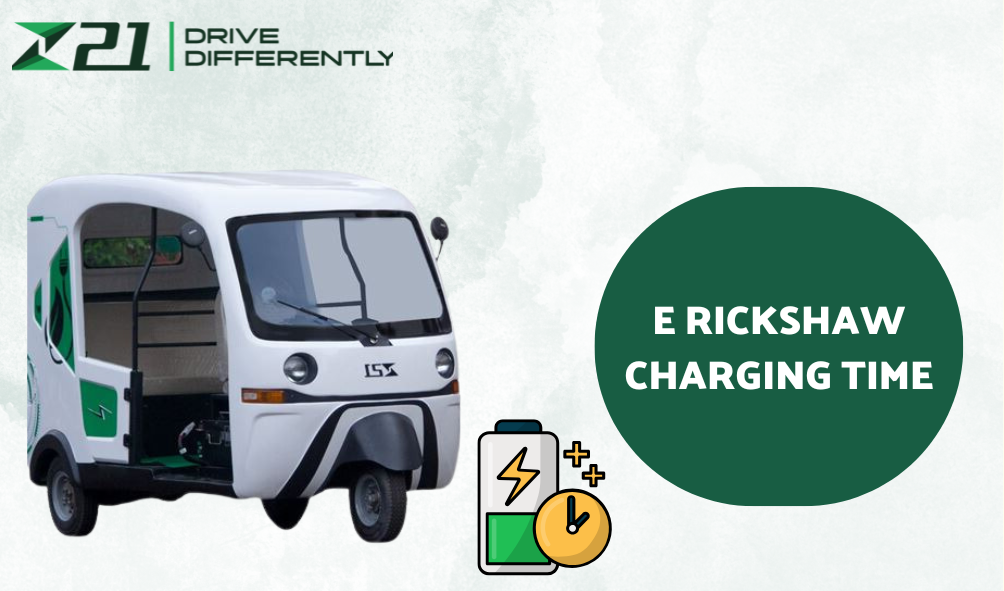These electric rickshaws have come close to being a viable solution for short distance transportation and are environmentally friendly. It is necessary to understand e rickshaw charging time for drivers, fleet operators, and owners due to its relation to daily use, flexibility, and expenses. This guide looks at the factors that determine charging time, the various chargers and how to charge your device more efficiently.
Possible Influences on E Rickshaw Charging Time
Several factors can influence how long it takes to charge an e-rickshaw:
- Battery Capacity:
Charging time is therefore highly determined by the size and capacity of the e-rickshaw battery. High density batteries are usually charged for a longer time but offer the ability to travel more distance based on charge. The battery of most e-rickshaw is between 48V and 60V with higher capacity batteries made for longer rides.
- Charger Type:
Chargers come in various types, and each type influences the e rickshaw charging time:
- Standard Chargers: Common to home or local charging stations, these chargers operate on standard voltage and charge the battery for a long time usually 6 to 8 hours.
- Fast Chargers: These chargers can reduce charging time considerably, charge the battery fully in 2 to 4 hours. However, they are costly and possibly may necessitate special facilities such as additional power supply and skilled human resources.
- Battery Condition and Age:
An e-rickshaw battery may degrade over time and this means that charging times will take longer than before. Maintenance and charging are essential to the longevity of a battery; however, whenever a battery is old, it is going to take a longer time to recharge than a new battery.
- Power Source:
However, the duration it takes to fully charge the battery depends on the power output from the source; home or a dedicated charging station. Charging from a dedicated station is likely to deliver higher power output and that will make charging take a shorter time than using a standard home outlet.
How Long does it normally take to charge an E-Rickshaw?
Another shortcoming is that the commonly used battery of an e-rickshaw requires approximately 6 to 8 hours to be charged completely with a standard charger. This duration enables owners to plug in their vehicles and charge them to enable the next day operation. Whereas fast chargers can bring down this amount of time to about 2 to 4 hours, an important consideration for operators of e-rickshaws who require frequent recharges.
How To Reduce e rickshaw charging time
If you want to maximize efficiency and reduce e rickshaw charging time, consider these tips:
- Choose the Right Charger:
Choosing a fast charger for a car, as it is more expensive in comparison with a slow one, will save time and become more effective during the day. Make sure that the charger you are going to use does not damage your battery because of the wrong specifications.
- Maintain Battery Health:
This helps to keep the battery in the best state and hence retain the charging ability that it has. It is important not to charge the battery to full or deplete it completely as they are bad for the battery.
- Invest in Battery Management Systems (BMS):
Battery Management system assists to monitor the charge and discharge rate of the battery. BMS helps to ensure that battery charges effectively and safely, and thus increases battery life and performance.
- Use Dedicated Charging Stations When Possible:
Specialized stations give out more power to the car; they can charge the car in a shorter period than normal charging stations. One should consider purchasing one if charging time is a major factor in your business.
- Plan Charging Around Downtime:
They add that since charging the battery may decrease e-rickshaw availability, it is best to charge the vehicle during times when it is not used, such as at night. For fleet owners for instance, having rotating charging schedules to ensure that several vehicles are on the road at any one time is beneficial.
E Number of Charging Unit for E Rickshaw per day
The charging unit of the e rickshaw charging unit per day relies on factors such as the usage frequency, battery, and the type of charger in use.In the average range, charging an e rickshaw could go as high as 2 to 4 kilowatt hours per unit per day which is a lot of energy.I estimated that on average, charging an e rickshaw might require between 2 to 4 kilowatt hours per unit daily, which when combined by many, amounts to a considerable amount of energy consumption., battery capacity and kind of charger in use.On average, charging an e rickshaw could range from 2 to 4 kilowatt hours e rickshaw charging unit per day which is an enormous amount of energy.de, battery capacity, and charger type. On average, an e-rickshaw charging unit per day could be between 2 to 4 kWh, which adds up to a significant amount of energy usage. Managers and superintendents can adjust their schedules in a way that will ensure that their fleet remains productive without breakdowns.
Charging Technology of E Rickshaw for the Future
Since e-rickshaw is a relatively recent invention the battery technology and charging technology is also improving. Current batteries are being developed to have shorter charge time and higher energy density; lithium-ion batteries and solid-state batteries are being planned to be more efficient and more durable. The availability of fast charging points for e-rickshaw battery charging is also increasing so that e-rickshaw operators need not wait lengthy hours to charge their vehicles and manage smooth business functioning.
Proper charging is central to the utilisation and operational costs of e-rickshaw as a form of transport. This paper aims to determine the e rickshaw charging time and the factors that affect it in order to enable owners and operators to make the best decisions regarding the performance of their vehicle. For those considering affordable and efficient electric 3-wheelers, Zero21 provides state-of-art models with sustainability and performance which will enable many more people to embrace the adoption of electric vehicles.
The charging of the e- rickshaw charging unit must also be monitored per day since this depends on the usage and the type of charging system to be used. Through charging the e rickshaw charging unit per day, the operators will be able to schedule the charging of the battery appropriately so that the operation of the e rickshaw can be enhanced throughout the day. This in turn assists in cutting on costs and enhancing efficiency of the fleet.


